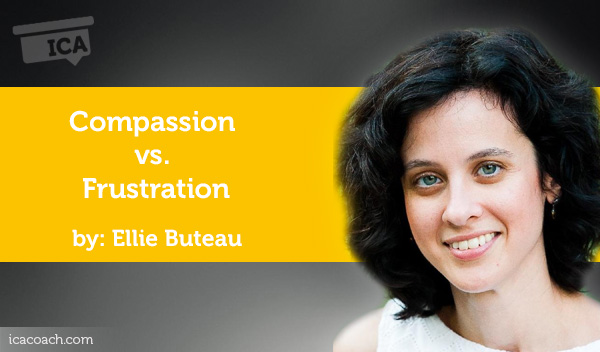
A Coaching Power Tool Created by Ellie Buteau
(Executive Coach, UNITED STATES)
Every single person in this world is wounded and struggling in their own unique way. When you allow yourself to completely see that, you open the door to unlimited compassion and love, which, by default, leads to genuine and authentic forgiveness. –Jennifer Wardowski
Compassion vs Frustration
Compassion: Sympathetic consciousness of others’ distress together with a desire to alleviate it.
Frustration: The feeling of being upset or annoyed, especially because of inability to change or achieve something; the prevention of the progress, success, or fulfillment of something.
When directed towards oneself, compassion becomes self-compassion. Kristen Neff, a researcher whose career has focused on the concept of self-compassion, describes it this way:
Instead of mercilessly judging and criticizing yourself for various inadequacies or shortcomings, self-compassion means you are kind and understanding when confronted with personal failings…
Frustration is related to the prevention of progress of fulfillment; compassion is moving toward alleviation. Preventing can create a disempowering state, whereas moving toward something can be an empowering experience.
It can be easy to get caught up in the feeling that something cannot be changed, or progress cannot be made—to feel disempowered and let frustration rule the situation. Sometimes, repeated frustration with the same situation results in a person getting stuck in patterns, feeling unable to make the progress they wish they could make.
But there is an empowering alternative. When we are facing difficult moments in our lives, we can recognize that we, and perhaps whoever else is involved, are experiencing a trying time. And, rather than treat ourselves or others harshly, we can practice compassion, for others and for ourselves.
Compassion for others begins with kindness to ourselves– Pema Chodron
In coaching, clients often bring as their topic something with which they are struggling—whether it be challenges with colleague or family members, their career, or self-care. Frustrations can crop up in any situation we encounter in our daily lives.
Take, for example, Kathleen. Kathleen is so frustrated with her colleague Megan that she does everything she can to avoid Megan at work. Her avoidance tactics are starting to affect her relationships with other colleagues and her participation in meetings. Kathleen is looking for a coping strategy that will enable her to succeed at her job, while not feeling derailed by Megan.
Through coaching, Kathleen realizes that instead of blaming Megan for their interpersonal issues and always feeling frustrated with her, she can show compassion for Megan and for herself. This leads Kathleen to change her behavior toward Megan. She invites Megan to lunch to get to know her a bit better. She learns more about why Megan does some of the things she does at the office and starts to understand Megan as a whole person.
Kathleen’s coping strategy enables her to feel more comfortable at work. Her relationship with Megan improves, and eventually her job performance returns to her usual level of exceeding expectations in her role.
Usually when someone is angry we hear their angry words. Instead, try hearing the unspoken, ‘I am scared, I am frustrated, I am insecure, I am vulnerable, I am threatened.’ The words are less important than the actual trigger and will hurt less if we recognize this.-Dr. Charles, Coach MD
[1]https://www.merriam-webster.com/dictionary/compassion
[2]https://en.oxforddictionaries.com/definition/frustration
[3]http://self-compassion.org/the-three-elements-of-self-compassion-2/
[4]https://goo.gl/images/g6hWCm